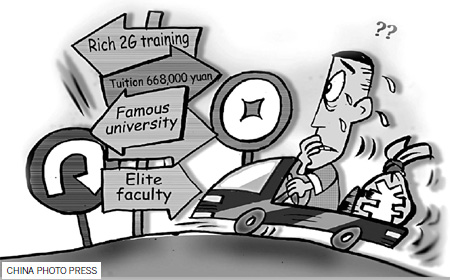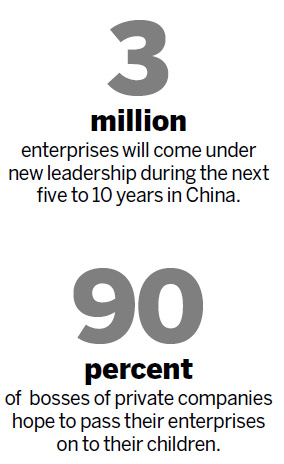Focus
Rich 2G learning to inherit wealth
By Du Guodong (China Daily)
Updated: 2010-07-20 10:05
 |
Large Medium Small |

In the well-known work the Analects of Confucius, China's great thinker Confucius commented: "With education there is no distinction between classes or races of men," emphasizing that education should be equal for everyone, regardless of age, background and social status.
In marked contrast to the old adage, an explosion of high-end training classes tailored for the rich second generation (Rich 2G) appeared recently.
Classes include horse riding, swordsmanship, golf and wine tasting as well as various techniques for steering a company.
Some of the training programs even include pilgrimages to revolutionary sites and visits to the US Military Academy at West Point.
Organizers said they wanted to promote the trainees' noble characters and comprehensive qualities so they could successfully take over their parents' companies and survive in the increasingly fierce market.
Unlike their parents, who went from rags to riches during China's early stages of "opening up", Rich 2G members are often criticized for inheriting huge assets from their parents and are being labeled as a generation with less responsibility and an inclination to indulge in pleasure-seeking.
The courses aimed at getting them ready for the responsibilities ahead are distinguished by their high tuition fees that typically run to tens of thousands of yuan.
Early this year, a training class at Wuxi in Southern China's Jiangsu province, offered 12 weeks of tuition for 668,000 yuan.
Li Fahai, president of Goodidea Management Education Group, told the Beijing News that such training classes started two years ago and have become increasingly popular. But Li said the market is far from mature and the courses are not standardized and lack a systematic curriculum.
Li said there are at least 20 training institutions across the country with the majority in big cities including Beijing and Shanghai.

He estimated that the market is worth 10 billion yuan and said it will take at least five to 10 years for the market to be fully-fledged.
"Unfortunately, most of the training bodies at present are holding programs merely because they are lucrative. They boast a faculty of famous teachers or top entrepreneurs but the actual situation are usually not the case," he said.
In Beijing, there are at least three well known such training classes, including programs at Peking University, Tsinghua University and Beijing Huashang Institute of Management (BHIM), a training body mainly for private enterprises.
Zhang Peng, a trainee at BHIM, will graduate next month after studying since 2008 and spending 48,000 yuan on five days of classes every two months.
"Other than what I learned in class, I cherish most the interpersonal relationships I got from the course," he said.
Another student, Hu Penghui, who has not yet graduated from college, said there are only two girls in the class and most students are in their 20s.
"People are full of misunderstandings now about the Rich 2G," Hu said. "Most of my classmates are not good-for-nothing, they have their own dreams and want to start their own enterprises."
Both were sent to the class by their parents.
Yuan Qingpeng, director of BHIM said that during the next five to 10 years, a total of 3 million enterprises will come under new leadership and as many as 90 percent of bosses of private companies hope to pass their enterprises on to their children.
With the Chinese obsessed with the idea of passing their wealth and property on to their children, and with so many millionaires and entrepreneurs now reaching retirement age, the training courses to prepare the next generation for leadership roles are more popular than ever.
Statistics from the Hurun Report on China's wealthiest people last year show that China has a total of 825,000 individuals worth more than 10 million yuan and 51,000 with more than 100 million yuan.
Beijing has the largest number of wealthy people in China, with 143,000 multimillionaires and 8,800 billionaires in the capital.
According to Professor Qu Jun, a director of the second generation enterprise training program at Peking University, 95 percent of trainees at the institution were enrolled at the behest of their parents.
He added that in the United States, only 30 percent of family businesses are taken over by the second generation and just 12 percent make it to the third generation.
"In China, the situation is far different and the Rich 2G need to be equipped with the knowledge to run a company and the help they need to achieve their own goals and play a positive role in society," Qu told METRO.
There are mainly three types of training classes in China. Programs by universities are the most common. There are also programs run by non-governmental institutions and government bodies.
"With its burgeoning market, China, at present
is in chaos when it comes to such training," said Yuan.
"Because it is easy to make a fortune in the training market, that has spurred many institutions that do not have credentials to vie for a finger in the pie," he said.